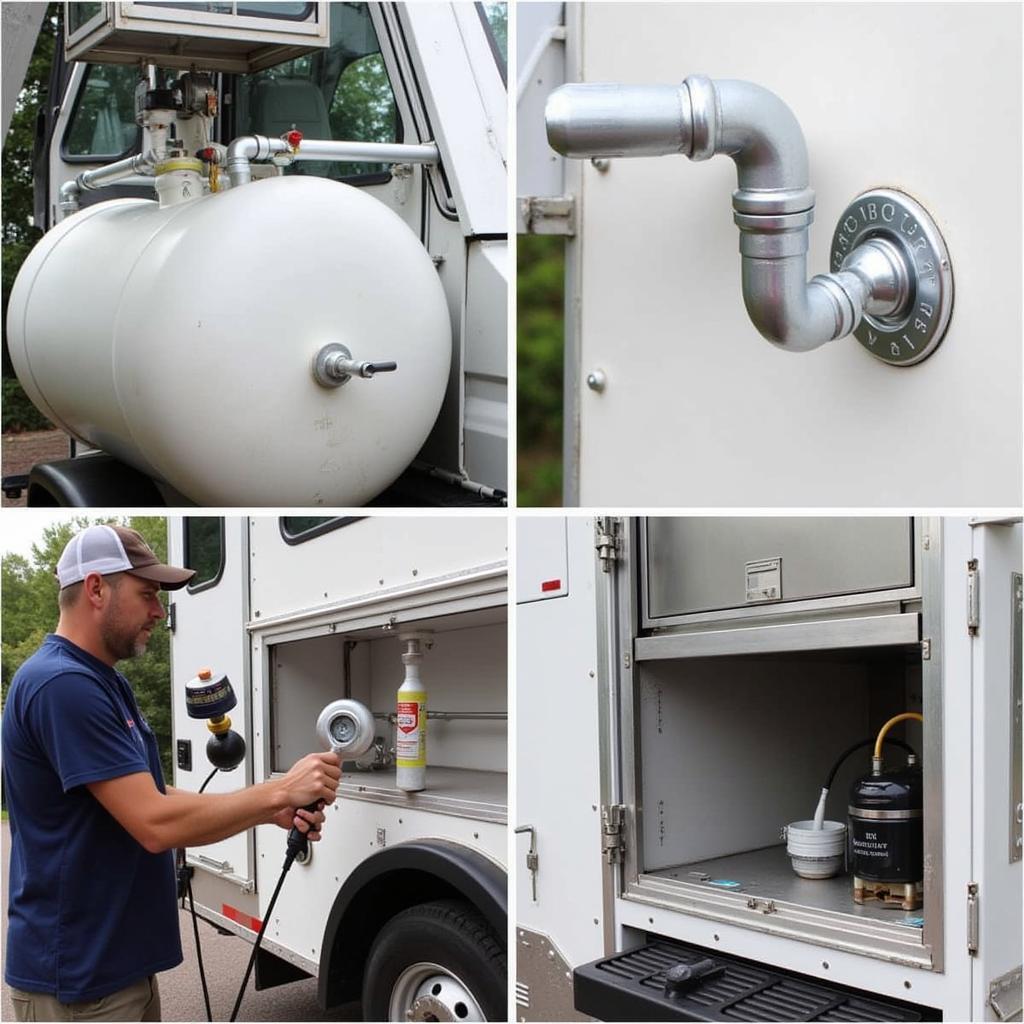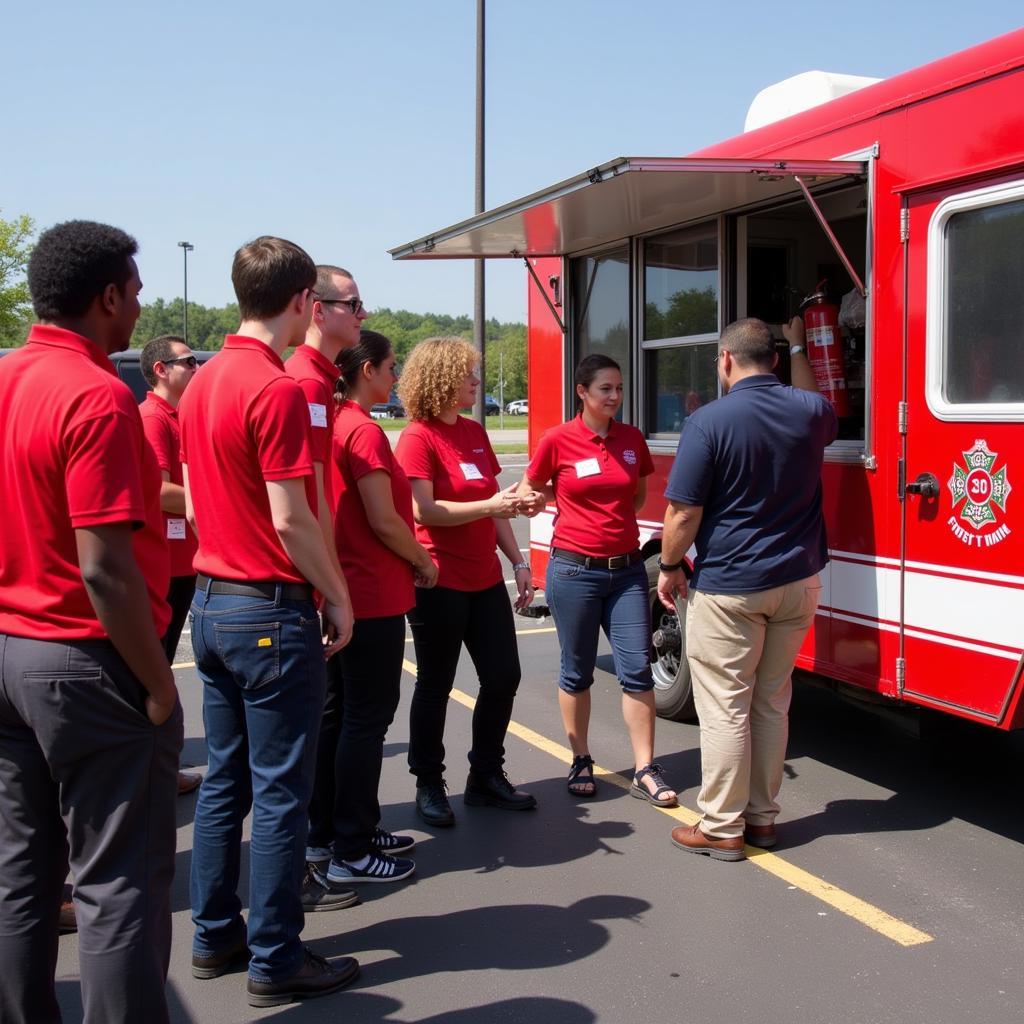A Food Truck Fire Inspection Checklist is essential for every mobile food vendor. It not only keeps you, your staff, and your customers safe but also ensures you’re complying with regulations, avoiding hefty fines, and maintaining a positive reputation. Understanding the key elements of a fire inspection checklist is crucial for a smooth and successful operation.
Thinking of starting your food truck empire? Check out our food truck starter pack for everything you need to get started!
Fire Suppression System Essentials
Your fire suppression system is the heart of fire safety in your food truck. Regular inspections and maintenance are non-negotiable. The checklist should cover the type of system installed, its current certification date, the pressure gauge readings, and the condition of the nozzles and piping. Any signs of damage, leaks, or corrosion warrant immediate attention from a qualified technician. Don’t wait for an inspection to discover problems – proactive maintenance is key.
Fuel Safety: Preventing Catastrophe
Handling flammable cooking fuels requires extra vigilance. Your checklist should detail proper storage procedures for propane tanks, including secure mounting, ventilation, and leak checks. Connections and hoses need to be in top condition, free from cracks or wear. Also, establish clear protocols for refueling, ensuring it’s done in a well-ventilated area away from ignition sources.
 Food Truck Propane Tank Safety Check
Food Truck Propane Tank Safety Check
Electrical System Safety: Avoiding Sparks
Electrical systems are another common source of food truck fires. The checklist needs to cover the condition of wiring, outlets, and appliances. Overloaded circuits, frayed wires, and damaged plugs are red flags. Ensure all electrical equipment is properly grounded and that extension cords are rated for commercial use. Regularly inspect and test GFCI outlets to guarantee they’re functioning correctly.
Kitchen Equipment Safety: Maintaining Control
Your cooking equipment is the workhorse of your food truck, but it also presents fire hazards. The checklist must address the cleanliness of cooking surfaces, the proper functioning of ventilation hoods, and the safe operation of fryers and grills. Grease buildup is a major fire risk, so regular cleaning is paramount. Make sure your ventilation system is powerful enough to handle the demands of your cooking equipment and that all filters are clean.
Looking to upgrade your cooking equipment? Check out our selection of food truck ovens.
Exit Strategies and Emergency Preparedness
In the event of a fire, a swift and organized evacuation is critical. Your checklist should detail clear exit routes and emergency procedures. Ensure fire extinguishers are readily accessible, properly charged, and that all staff members know how to use them. Conduct regular fire drills to practice evacuation procedures and ensure everyone understands their roles.
Frequently Asked Questions (FAQ)
What type of fire extinguisher should I have in my food truck? A Class K fire extinguisher is essential for grease fires, which are common in food truck kitchens. You should also have a Class A-B-C extinguisher for other types of fires.
How often should I have my fire suppression system inspected? Professional inspections are typically recommended every six months or as required by local regulations.
What are the most common fire hazards in a food truck? Grease buildup, faulty electrical systems, and improper fuel storage are the leading causes of food truck fires.
Can I perform my own fire safety inspections? While regular self-checks are essential, professional inspections are crucial for ensuring compliance and identifying potential hazards you might overlook.
What are the penalties for failing a fire inspection? Penalties vary depending on the severity of the violations and local regulations. They can range from fines to temporary closure of your business.
Where can I find a qualified fire suppression system technician? Contact your local fire department or search online for certified fire suppression system service providers in your area.
Expert Insights
“Fire safety is not just a checklist; it’s a culture. Every team member needs to be actively involved in maintaining a safe environment.” – Chef Michael Ramirez, Certified Fire Safety Instructor
“Investing in preventative maintenance and regular inspections is far less costly than dealing with the aftermath of a fire.” – Maria Sanchez, Food Truck Business Consultant
 Food Truck Fire Extinguisher Training
Food Truck Fire Extinguisher Training
Conclusion
A comprehensive food truck fire inspection checklist is vital for safeguarding your business, your staff, and your customers. By proactively addressing potential fire hazards and adhering to safety regulations, you can ensure a successful and worry-free operation. Don’t underestimate the importance of regular inspections and maintenance – they are an investment in the long-term success of your food truck business. Are you interested in starting your food truck journey with a fryer food cart? We have options for you. Or perhaps, exploring a food truck for lease to own might be a better fit for your business plan. And if you’re in the Dallas area, we also have a selection of food trailer for sale dallas.
For further assistance, contact us at Phone Number: 02437655121, Email: minacones@gmail.com or visit us at 3PGH+8R9, ĐT70A, thôn Trung, Bắc Từ Liêm, Hà Nội, Việt Nam. Our customer service team is available 24/7.